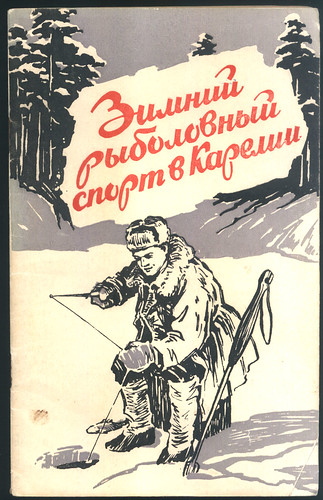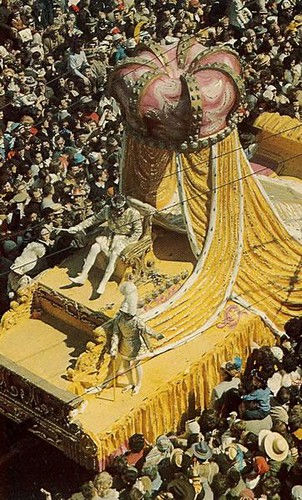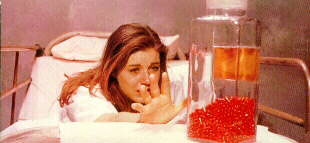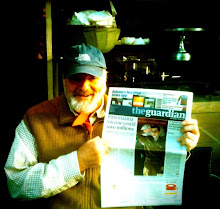Sunday, 22 November 2009
Double Bunk (C.M. Pennington-Richards, 1961)
Janette Scott as Peggy
"DOUBLE BUNK" just about covers it at the Guild Theatre, where this extremely anemic little British comedy about a rickety houseboat honeymoon went on yesterday. And on and on, it might be added—bumping up and down the Thames, across to France (by accident) and back. This Showcorporation release, written and directed by C. M. Pennington-Richards, with Ian Carmichael and Janette Scott in the leads, is recommended for undemanding folks who make it to a movie comedy about once every fifteen years. Admirers of English comic wizards like Alec Guinness, Peter Sellers and Terry-Thomas are warned.
The picture is about as friendly, simple-minded and familiar as can be. Take the ramshackle house in "George Washington Slept Here," float it, add the same internal problems (with a "beastly engine" instead of medieval plumbing), plus a mean neighbor (this one has a swanky yacht).
Mr. Carmichael, as the skipper-spouse, has been mercifully toned down, for a change, and Miss Scott is a sensible peach of a bride. As two cronies who go along for the ride, Sidney James is leathery, and Liz Fraser fills a bikini admirably. The menace is Dennis—Dennis Price.
DOUBLE BUNK, written and directed by C. M. Pennington-Richards produced by George H. Brown; released by Showcorporation. At the Guild Theatre, Fiftieth Street west of Fifth Avenue. Running time: ninety-two minutes.
Jack . . . . . Ian Carmichael
Peggy . . . . . Janette Scott
Sid . . . . . Sidney James
Sandra . . . . . Liz Fraser
Watson . . . . . Dennis Price
Harper . . . . . Reginald Beckwith
HOWARD THOMPSON New York Times 17 November 1961
My Darling Clementine
Let's be specific about this: The eminent director, John Ford, is a man who has a way with a Western like nobody in the picture trade. Seven years ago his classic "Stagecoach" snuggled very close to fine art in this genre. And now, by George, he's almost matched it with "My Darling Clementine."
Not quite, it is true—for this picture, which came to the Rivoli yesterday, is a little too burdened with conventions of Western fiction to place it on a par. Too obvious a definition of heroes and villains is observed, and the standardized aspect of romance is too neatly and respectably entwined. But a dynamic composition of Western legend and scenery is still achieved. And the rich flavor of frontiering wafts in overpowering redolence from the screen.
In this particular instance, Mr. Ford and Twentieth Century-Fox are telling an oft-repeated story from the treasury of Western lore. It's the story of that famous frontier marshal who "cleaned up" Tombstone, Ariz.—Wyatt Earp. And if that doesn't place him precisely in the history catalogue, rest assured that he's been model for film heroes ever since the days of William S. Hart. And since legend is being respected, as well as the conventions of the screen, it is the story of Wyatt's dauntless conquest of a gang of rustlers and a maiden's heart.
But even with standard Western fiction—and that's what the script has enjoined—Mr. Ford can evoke fine sensations and curiously-captivating moods. From the moment that Wyatt and his brothers are discovered on the wide and dusty range, trailing a herd of cattle to a far-off promised land, a tone of pictorial authority is struck—and it is held. Every scene, every shot is the product of a keen and sensitive eye—an eye which has deep comprehension of the beauty of rugged people and a rugged world.
As the set for this film, a fine facsimile of frontier Tombstone was patiently built in the desert of Monument Valley, and it was there that Mr. Ford shot most of the picture. And he is a man who knows that Westerns belong, in the main, out of doors. When he catches a horseman or a stagecoach thumping across the scrubby wastes, the magnificences of nature—the sky and desert—dwarf the energies of man. Yet his scenes of intensity and violence are played very much to the fore, with the rawness and meanness of the frontier to set his vital human beings in relief.
And the humans whom Mr. Ford imagines are not the ordinary stereotypes of films, no matter how hackneyed and conventional the things they are supposed to do. Henry Fonda, for instance, plays a Wyatt Earp such as we've never seen before—a leathery, laconic young cowpoke who truly suggests a moral aim. Through his quiet yet persuasive self-confidence—his delicious intonation of short words—he shows us an elemental character who is as real as the dirt on which he walks.
And Walter Brennan is completely characteristic as the scabby old desert rattlesnake whose villainous murder of Wyatt's brother sets off the dramatic fireworks. Even the mawkish fabrication of a young doctor gone to seed and turned bad-man (who later turns a good man) is soundly played by Victor Mature—not to mention the several rawhide buckos who twirl guns and hide behind beards, which are played by such competent actors as Tim Holt, Don Garner and Ward Bond. Mr. Ford is less knowing with the females. Linda Darnell makes a pin-up of a trull, and Cathy Downs is simply ornamental as a good little girl from back East.
However, the gentlemen are perfect. Their humors are earthy. Their activities are taut. The mortality rate is simply terrific. And the picture goes off with several bangs.
MY DARLING CLEMENTINE, screen play by Samuel G. Engel and Winston Miller; based on a story by Sam Hellman; from a book by Stuart N. Lake; directed by John Ford, produced by Mr. Engel for Twentieth Century-Fox. At the Rivoli.
Wyatt Earp . . . . . Henry Fonda
Chihuahua . . . . . Linda Darnell
Doc Holliday . . . . . Victor Mature
Old Man Clanton . . . . . Walter Brennan
Virgil Earp . . . . . Tim Holt
Clementine . . . . . Cathy Downs
Morgan Earp . . . . . Ward Bond
Thorndyke . . . . . Alan Mowbray
Billy Clanton . . . . . John Ireland
Mayor . . . . . Roy Roberts
Kate Nelson . . . . . Jane Darwell
Ike Clanton . . . . . Grant Withers
Bartender . . . . . J. Farrell MacDonald
John Simpson . . . . . Russell Simpson
James Earp . . . . . Don Garner
Town Drunk . . . . . Francis Ford
Barber . . . . . Ben Hall
Hotel Clerk . . . . . Arthur Walsh
BOSLEY CROWTHER New York Times 4 December 1946
Prayers for young people: Unconsciousness
From Young People's Prayers by Percy R. Hayward, illustrated by Chester Bratten, 1947
'79 Park Avenue' - Harold Robbins
Cover painting by Tom Dunn. Pocket Books. First published 1955, this reprint 1956.
Mae West
From Capote's "The Dog's Bark":
"Only once did the tougher Mae reveal herself. The display was occasioned by an intense young girl who, approaching the actress, announced, "I saw Diamond Lil last week; it was wonderful."
"Didja honey? Wherejda see it?"
"At the museum. The Modern Museum."
And a dismayed Miss West, seeking shelter in the sassy drawl of her famous fabrication, inquired, "Just whaddya mean honey, A museum?"
Iconic....
I was once deemed totally "homo" for having a Judy Garland lp in my record collection...sigh....I still take it as a compliament....

















